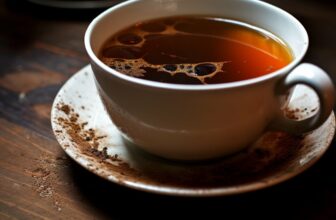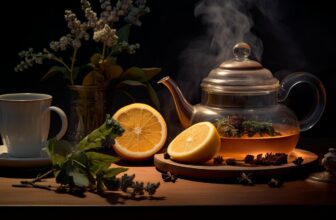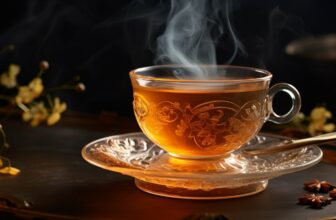
Black tea offers a range of flavors and characteristics, from bold and malty to floral and fruity. With its distinct taste and potential health benefits, loose leaf black tea has garnered a loyal following. To fully appreciate the nuanced flavors of black tea, it’s essential to understand the various varieties and brewing techniques that enhance its taste.
Key Takeaways:
- Black tea has a diverse flavor profile, ranging from bold and malty to floral and fruity.
- There are various popular varieties of loose leaf black tea, each with its own unique characteristics and flavor profiles.
- Black tea blends, such as English Breakfast, Earl Grey, and Chai, offer delightful twists by combining black tea with other ingredients.
- Black tea is rich in antioxidants and may offer potential health benefits for heart health, digestion, and energy boost.
- When tasting black tea, it’s important to pay attention to the color, aroma, and flavor notes to fully appreciate its complexities.
Understanding the Variety: Exploring Black Tea Types
Loose leaf black tea is renowned for its distinct characteristics and potential health benefits. As a tea lover, I find it fascinating to explore the different types of black tea and discover their unique flavor profiles. From Guangxi Black Tea to Yunnan Black Tea, each variety has its own charm and offers a delightful experience for the taste buds.
Let’s start with Guangxi Black Tea, which is known for its malty flavor and strong aroma. This variety originates from the Guangxi province in China and is often described as smooth and full-bodied. It pairs well with milk and sugar, making it a popular choice for breakfast tea.
Next, we have Yunnan Black Tea, which hails from the Yunnan province of China. It is characterized by its earthy and slightly sweet taste, with subtle hints of chocolate and honey. Yunnan Black Tea is known for its golden buds, which contribute to its unique flavor profile. It can be enjoyed plain or with a dash of milk.
Souchong Black Tea, on the other hand, offers a smoky and robust flavor. This variety is made by smoking the tea leaves over pine wood, resulting in a distinctive aroma and taste. It is often used in blends like Russian Caravan tea and is a favorite choice for those who enjoy bold and smoky flavors.
Black Tea Types and Their Flavor Profiles:
| Black Tea Variety | Origin | Flavor Profile |
|---|---|---|
| Guangxi Black Tea | Guangxi province, China | Malty, smooth, full-bodied |
| Yunnan Black Tea | Yunnan province, China | Earthy, slightly sweet, hints of chocolate and honey |
| Souchong Black Tea | Various regions | Smoky, robust |
In addition to these varieties, Yingde Black Tea and Wild Souchong Black Tea also offer their own unique flavor profiles. The former is known for its fruity and floral notes, while the latter has an intense smoky flavor. It’s incredible how black tea can surprise and delight us with its diverse range of flavors.
As you explore the world of black tea, I encourage you to try different varieties and appreciate their distinct characteristics. Experiment with brewing techniques, discover your preferences, and enjoy the journey of uncovering the complexities of black tea.
Brewing Techniques: Enhancing the Black Tea Experience
Brewing techniques are essential to fully appreciate the nuanced flavors of black tea. By following proper brewing methods, you can unlock the true potential of your black tea leaves and enjoy a rich and satisfying cup of tea.
Here are some tips to help enhance your black tea experience:
- Water temperature: Different black teas require different water temperatures for optimal flavor extraction. Generally, the water temperature for brewing black tea ranges from 195°F to 205°F (90°C to 96°C). Boiling water may result in bitter or astringent flavors, so it’s important to get the temperature right.
- Brewing time: The steeping time for black tea can vary depending on the type of tea and your personal preference. As a general guideline, black tea is steeped for 3 to 5 minutes. Steeping for a shorter time will result in a milder flavor, while a longer steeping time can produce a stronger and more robust brew. Experiment with different steeping times to find your perfect balance.
- Tea-to-water ratio: Finding the right tea-to-water ratio is crucial for achieving the desired strength and flavor. Typically, 1 teaspoon of loose leaf black tea per 8 ounces (240 ml) of water is a good starting point. Adjust the amount based on your preference for a stronger or milder brew.
- Quality water: The quality of water used can greatly impact the taste of your black tea. Filtered water is recommended to remove any impurities or chlorine that may affect the flavor. Using fresh, cold water also ensures a cleaner taste.
- Teaware: Using the right teaware can further enhance your black tea experience. Choose a teapot or infuser that allows the leaves to fully expand and release their flavors. A porcelain or ceramic teapot is ideal for black tea, as it retains heat well and does not impart any unwanted flavors.
By paying attention to these brewing techniques, you can unlock the full potential of black tea and savor its unique taste and aroma. Whether you prefer a bold and malty Assam or a delicate and floral Darjeeling, brewing your black tea with care and precision will ensure a satisfying cup every time.
| Black Tea Variety | Flavor Profile |
|---|---|
| Assam | Strong, malty, and full-bodied |
| Darjeeling | Delicate, floral, and muscatel notes |
| Ceylon | Bright, citrusy, and medium-bodied |
| Keemun | Smooth, rich, and slightly smoky |
| Lapsang Souchong | Intensely smoky and robust |
| Yunnan | Earthy, sweet, and chocolatey |
Remember that taste is subjective, and everyone’s palate is unique. Experiment with different brewing techniques and explore the wide range of black tea varieties to find your personal favorites. Whether you prefer a strong and robust cup or a subtle and nuanced brew, black tea offers a world of flavors to discover.
The Fascinating World of Black Tea Varieties
There are various popular varieties of loose leaf black tea, such as Guangxi Black Tea, Yunnan Black Tea, Souchong Black Tea, Yingde Black Tea, and Wild Souchong Black Tea. Each of these varieties has its own unique flavor profiles and brewing requirements, offering tea enthusiasts a diverse range of options to explore and savor.
Guangxi Black Tea, known for its vibrant red liquor and smooth taste, is a popular choice among black tea connoisseurs. Yunnan Black Tea, on the other hand, captivates with its rich and malty flavor, often accompanied by subtle hints of chocolate or honey. Souchong Black Tea, with its distinct smoky aroma and robust taste, delivers a unique sensory experience. Yingde Black Tea charms with its floral notes and delicate sweetness, while Wild Souchong Black Tea offers a more earthy and full-bodied flavor.
To fully appreciate the nuances of these black tea varieties, it is important to brew them according to their specific requirements. For example, Yunnan Black Tea is best brewed with water around 195°F (90°C) for 2-3 minutes to bring out its bold flavors, while Guangxi Black Tea benefits from steeping at a slightly higher temperature of 203°F (95°C) for 3-4 minutes to extract its smoothness.
| Black Tea Variety | Flavor Profile | Brewing Requirements |
|---|---|---|
| Guangxi Black Tea | Smooth, vibrant red liquor | Water at 203°F (95°C), 3-4 minutes |
| Yunnan Black Tea | Rich, malty, hints of chocolate or honey | Water at 195°F (90°C), 2-3 minutes |
| Souchong Black Tea | Distinct smoky aroma, robust taste | Water at 212°F (100°C), 3-5 minutes |
| Yingde Black Tea | Floral notes, delicate sweetness | Water at 195°F (90°C), 2-3 minutes |
| Wild Souchong Black Tea | Earthy, full-bodied | Water at 203°F (95°C), 3-4 minutes |
Exploring the world of black tea varieties is a delightful journey for tea lovers. Whether you prefer a smooth cup with floral notes, a bold and malty brew, or a smoky and robust infusion, there is a black tea variety to suit every palate. Take the time to experiment with different brewing techniques and appreciate the nuances that each variety brings to the table.
Remember, the world of black tea is vast and filled with intriguing flavors waiting to be discovered. So, grab your favorite teapot and embark on a tasting adventure to uncover the wonders of Guangxi Black Tea, Yunnan Black Tea, Souchong Black Tea, Yingde Black Tea, and Wild Souchong Black Tea.
Black Tea Blends: Adding a Twist to the Taste
Black tea blends, such as English Breakfast, Earl Grey, and Chai, offer a delightful twist by combining black tea with other ingredients. These blends have gained popularity for their unique and flavorful profiles. Let’s explore some of the most loved black tea blends and what makes them so special.
English Breakfast:
This classic blend is a combination of black teas from different regions, typically Assam, Ceylon, and Keemun. Known for its robust and full-bodied taste, English Breakfast is often enjoyed with a splash of milk. It pairs well with a hearty breakfast and provides a strong, invigorating start to the day.
Earl Grey:
Earl Grey is a black tea infused with the essence of bergamot, a citrus fruit. It offers a fragrant and floral aroma with a hint of citrus. The unique flavor profile of Earl Grey makes it a popular choice for tea lovers seeking a refreshing and aromatic drink. This blend can be enjoyed plain or with a dash of milk and sugar.
Chai:
Chai is a spiced black tea blend that originated in India. It combines black tea with a mix of aromatic spices such as cinnamon, cardamom, cloves, and ginger. Chai offers a warming and rich flavor, with each sip delivering a complex blend of spices. Traditionally brewed with milk and sweetened with honey or sugar, Chai provides a comforting and indulgent tea experience.
Summary
Black tea blends bring a delightful twist to the taste of traditional black tea. Whether you prefer the robustness of English Breakfast, the floral notes of Earl Grey, or the spicy warmth of Chai, there’s a black tea blend to suit every palate. These blends offer a variety of flavors and aromas, making them a favorite choice for tea enthusiasts worldwide.
Table 1: Popular Black Tea Blends
| Blend | Main Ingredients | Flavor Profile |
|---|---|---|
| English Breakfast | Assam, Ceylon, Keemun | Robust, full-bodied |
| Earl Grey | Bergamot essence | Fragrant, floral, with a hint of citrus |
| Chai | Spices: cinnamon, cardamom, cloves, ginger | Warming, rich, and spicy |
Embracing the Health Benefits: Black Tea and Well-being
Black tea is rich in antioxidants and may offer potential health benefits for heart health, digestion, and energy boost. The antioxidants present in black tea, such as flavonoids and polyphenols, have been linked to reducing the risk of heart disease by improving cardiovascular health. These compounds help reduce inflammation and lower LDL cholesterol levels, contributing to a healthier heart.
Furthermore, black tea has been shown to aid digestion and promote gut health. The tannins found in black tea can help regulate bowel movements, reducing the risk of constipation. Additionally, black tea contains compounds that support the growth of beneficial gut bacteria, which play a vital role in maintaining a healthy digestive system.
When it comes to energy levels, black tea offers a moderate amount of caffeine, which can provide a gentle energy boost without the jitters associated with higher caffeine beverages. The combination of caffeine and L-theanine, an amino acid found in black tea, can enhance mental alertness and concentration, making black tea an ideal choice for a mid-afternoon pick-me-up.
Table 1: Potential Health Benefits of Black Tea
| Health Benefit | Description |
|---|---|
| Heart Health | The antioxidants in black tea can help reduce the risk of cardiovascular diseases by improving heart health and lowering cholesterol levels. |
| Digestion | Black tea aids digestion and promotes gut health by regulating bowel movements and supporting the growth of beneficial gut bacteria. |
| Energy Boost | With its moderate caffeine content and the presence of L-theanine, black tea provides a gentle energy boost and enhances mental alertness. |
To fully embrace the potential health benefits of black tea, it is important to incorporate it into a balanced and varied diet. Enjoying a cup of black tea alongside a nutritious meal can enhance its positive effects on well-being. However, it’s worth noting that excessive consumption of black tea or adding excessive amounts of sugar and milk may negate some of these health benefits. Moderation is key to reaping the rewards of black tea while maintaining a healthy lifestyle.
So, whether you’re savoring a robust Assam black tea or indulging in the fragrant aroma of a Darjeeling black tea, take comfort in knowing that each sip offers more than just flavor. Black tea has the potential to contribute to your overall well-being, supporting heart health, aiding digestion, and providing a natural energy boost.
In Summary: The Pleasure of Black Tea
Cupping, or tea tasting, can help explore the variety within black teas, revealing their unique qualities and complexities. Black tea offers a range of flavors and characteristics, from bold and malty to floral and fruity. Loose leaf black tea is renowned for its distinct characteristics and potential health benefits. When tasting black tea, it is important to pay attention to the color, aroma, and flavor notes.
The oxidation process, which black tea undergoes, is responsible for its dark color, strong taste, and longer shelf life. The different varieties of black tea, such as Assam tea, Darjeeling black tea, Ceylon black tea, breakfast teas, Keemun tea, Lapsang Souchong, and Yunnan black tea, have their own unique flavor profiles and brewing requirements.
Black tea blends, such as English Breakfast, Earl Grey, and Chai, offer a delightful twist by combining black tea with other ingredients. Adding sugar, milk, or citrus can enhance the taste of black tea. Black tea is rich in antioxidants and may offer potential health benefits for heart health, digestion, and energy boost.
Overall, black tea provides a pleasurable experience for tea enthusiasts. Its diverse flavors, health benefits, and the opportunity for exploration through cupping or tea tasting make it an enjoyable and satisfying beverage of choice.
FAQ
Q: What does black tea taste like?
A: Black tea offers a range of flavors, from bold and malty to floral and fruity. The taste can vary depending on the variety and brewing techniques.
Q: What are the different types of black tea?
A: Some popular varieties of black tea include Guangxi Black Tea, Yunnan Black Tea, Souchong Black Tea, Yingde Black Tea, and Wild Souchong Black Tea. Each variety has its own unique characteristics and flavor profiles.
Q: How should I brew black tea to enhance the taste?
A: Brewing techniques are essential to fully appreciate the nuanced flavors of black tea. It is important to pay attention to water temperature, steeping time, and the amount of tea leaves used.
Q: What are some popular black tea blends?
A: Black tea blends, such as English Breakfast, Earl Grey, and Chai, combine black tea with other ingredients to offer a delightful twist in terms of flavor. These blends can have a range of taste profiles, from bold and robust to aromatic and spicy.
Q: Are there any health benefits associated with black tea?
A: Black tea is rich in antioxidants and may offer potential health benefits for heart health, digestion, and energy boost. However, it is important to note that individual results may vary, and black tea should be consumed as part of a balanced diet and healthy lifestyle.
Q: How can I enhance the taste of black tea?
A: Adding sugar, milk, or citrus can enhance the taste of black tea. Additionally, flavored black tea blends, infused with ingredients such as cinnamon, ginger, cardamom, fruits, or flowers, offer a variety of delicious flavors.
Q: How can I explore the variety within black teas?
A: Cupping, or tea tasting, can help you explore the variety within black teas and reveal their unique qualities and complexities. By paying attention to color, aroma, and flavor notes, you can fully appreciate the diverse flavors of black tea.





